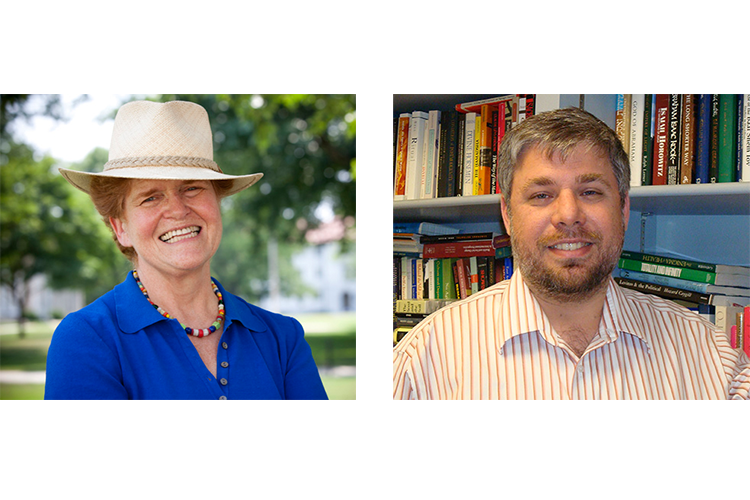Professors Add Personal Touch to Virtual Seminars

Two core faculty members of the Tam Institute for Jewish Studies, Professors Don Seeman and Deborah Lipstadt, taught their respective First Year Seminars virtually for the first time in fall of 2020 due to the ongoing coronavirus pandemic. Freshman year is a cornerstone of the college experience, and while first years can expect many new experiences, they did not expect that most of their classes would be held via Zoom. Though many of the freshmen in their respective seminars are currently located on or near campus, both Seeman and Lipstadt taught students from locations as diverse as Panama, Las Vegas, and China.
Professor Seeman’s course, titled “Suffering, Healing and the Evidence of Experience,” explores the nature of suffering that underlies the human condition and the different responses to suffering that religious and cultural traditions have tried to offer. Additionally, the first half of the semester covers ancient civilizations, while the second half is reserved for modern examples of suffering such as genocide, personal illness, and appropriately, pandemics.
Professor Seeman noted that the change in format has required some adjustments to the course—he finds that he is able to cover less material in an online format due to the complexity of the course, which requires a certain level of mental gymnastics to handle jumping between vastly different time periods.
He has also noticed that students, especially freshman, are more hesitant to speak up over Zoom than in person, and he says it can be hard to “pull them out of their shell.” Still, he makes it a point to teach freshman seminars because he observes first year students are truly there for the love of learning. Professor Seeman also finds it rewarding to meet students as freshmen, as it enables him to build relationships with students who return to his classes over the course of their college careers. Overall, Prof. Seeman says, “My sense is that a lot of them are doing pretty well, and Emory students are very good at coping.”
Something both professors share is the personal touch they add to their virtual classrooms. Professor Seeman meets one-on-one with each student at least once per semester, and Professor Lipstadt conducted “entrance” and “exit” interviews with each of her sixteen students. Lipstadt taught her First Year Seminar on “Memoirs of the Holocaust,” which includes close examination of both written memoirs and films.
“I have found it much more affirmative than I thought it would be. First of all, it’s sixteen students, so I can get them all on one screen. And that makes a big difference,” Lipstadt says. All her students were able to join class live, despite their differing time zones, thanks to the scheduling of the course in a mid-afternoon time slot.
At the beginning of the semester, Professor Lipstadt invited students in the Atlanta area to join her in her backyard for ice cream and a socially distanced one-on-one meeting. At the end of the semester, she hosted “exit” interviews on the outdoor patio behind the Marcus Hillel Center. Lipstadt recommends other professors take the time to meet with students individually. “Anybody can do that, even if you don’t live nearby. They have open tents all over campus, and that has worked very well, and the students enjoyed it.”
Professor Lipstadt is also making use of Emory tools such as the Canvas discussion board feature to facilitate educational and social connections while they remain physically distanced. She paired students up as discussion partners, and next semester she plans to switch pairings halfway through the course.
Both Lipstadt and Seeman found that first year Emory students are resilient. And, both have given their students positive experiences during their unusual first semester of college by bringing a human connection to a virtual experience.
Published 11/30/2020